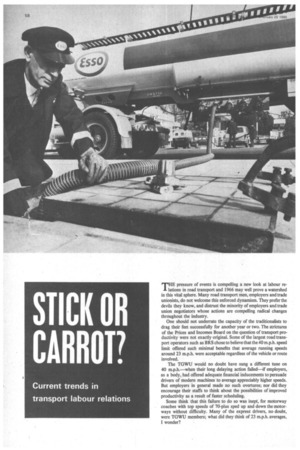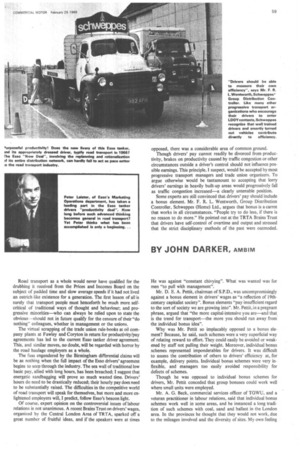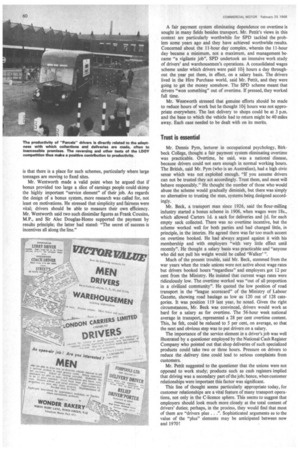STICK OR CARROT?
Page 60

Page 61

Page 62

If you've noticed an error in this article please click here to report it so we can fix it.
Current trends in transport labour relations BY JOHN DARKER, AmBim
'THE pressure of events is compelling a new look at labour re lations in road transport and 1966 may well prove a watershed in this vital sphere. Many road transport men, employers and trade unionists, do not welcome this enforced dynamism. They prefer the devils they know, and distrust the minority of employers and trade union negotiators whose actions are compelling radical changes throughout the industry.
One should not underrate the capacity of the traditionalists to drag their feet successfully for another year or two. The strictures of the Prices and Incomes Board on the question of transport productivity were not exactly original. Some of the largest road transport operators such as B RS chose to believe that the 40 m.p.h. speed limit offered such minimal benefits that average running speeds around 23 m.p.h. were acceptable regardless of the vehicle or route involved.
The TGWU would no doubt have sung a different tune on 40 m.p.h.—when their long delaying action failed—if employers, as a body, had offered adequate financial inducements to persuade drivers of modern machines to average appreciably higher speeds. But employers in general made no such overtures; nor did they encourage their staffs to think about the possibilities of improved productivity as a result of faster scheduling.
Some think that this failure to do so was inept, for motorway coaches with top speeds of 70-plus sped up and down the motorways without difficulty. Many of the express drivers, no doubt, were TGWU members; what did they think of 23 m.p.h. averages, wonder?
Road transport as a whole would never have qualified for the drubbing it received from the Prices and Incomes Board on the subject of padded time and slow average speeds if it had not lived an ostrich-like existence for a generation. The first lesson of all is surely that transport people must henceforth be much more selfcritical of traditional ways of thought and behaviour; and progressive minorities—who can always be relied upon to state the obvious—should not in future qualify for the censure of their "do nothing" colleagues, whether in management or the unions.
The virtual scrapping of the trade union rule-books at oil company plants at Fawley and Coryton in return for productivity/pay agreements has led to the current Esso tanker driver agreement. This, and similar moves, no doubt, will be regarded with horror by the road haulage employers as a whole.
The fuss engendered by the Birmingham differential claims will be as nothing when the fall impact of the Esso drivers' agreement begins to seep through the industry. The sea wall of traditional tow basic pay, allied with long hours, has been breached; I suggest that energetic sandbagging will prove so much wasted time. Drivers' hours do need to be drastically reduced; their hourly pay does need to be substantially raised. The difficulties in the competitive world of road transport will speak for themselves, but more and more enlightened employers will, I predict, follow Esso's beacon light.
Of course, expert opinion on the controversial issues of labour relations is not unanimous. A recent Brains Trust on drivers' wages, organized by the Central London Area of TRTA, sparked off a great number of fruitful ideas, and if the speakers were at times opposed, there was a considerable area of common ground.
Though drivers' pay cannot readily be divorced from productivity, brakes on productivity caused by traffic congestion or other circumstances outside a driver's control should not influence possible earnings. This principle, I suspect, would be accepted by most progressive transport managers and trade union organizers. To argue otherwise would be tantamount to accepting that lorry drivers' earnings in heavily built-up areas would progressively fall as traffic congestion increased—a clearly untenable position.
Some experts are still convinced that drivers' pay should include a bonus element. Mr. F. R. L. Wentworth, Group Distribution Controller, Schweppes (Home) Ltd., argues that bonus is a carrot that works in all circumstances. "People try to do less, if there is no reason to do more." He pointed out at the TRTA Brains Trust that drivers have self-control of overtime and output and stressed that the strict disciplinary methods of the past were outmoded.
He was against "constant chivying". What was wanted was for men "to pull with management".
Mr. D. E. A. Pettit, chairman of S.P.D., was uncompromisingly against a bonus element in drivers' wages as "a reflection of 19thcentury capitalist society". Bonus elements "pay insufficient regard to the sort of society we are growing into". Mr. Pettit, in a pregnant phrase, argued that "the more capital-intensive you are—and that is the trend for transport—the more you should run away from the individual bonus idea".
Why was Mr. Pettit so implacably opposed to a bonus element? Because, he said, such schemes were a very superficial way of relating reward to effort. They could easily be avoided or weakened by staff not pulling their weight. Moreover, individual bonus schemes represented imponderables for drivers. It was difficult to assess the contribution of others to drivers' efficiency at, for example, delivery points. Individual bonus schemes were very inflexible, and managers too easily avoided responsibility for defects of schemes.
Though he was opposed to individual bonus schemes for drivers, Mr. Pettit conceded that group bonuses could work well where small units were employed.
Mr. A. G. Beck, commercial services officer of TGWU, and a veteran practitioner in labour relations, said that individual bonus schemes work well in some areas, and he instanced a long tradition of such schemes with coal, sand and ballast in the London area. In the provinces he thought that they would not work, due to the mileages involved and the diversity of sites. My own feeling is that there is a place for such schemes, particularly where large tonnages are moving to fixed sites.
Mr. Wentworth made a valid point when he argued that if bonus provided too large a slice of earnings people could skimp the highly important "service element" of their job. As regards the design of a bonus system, more research was called for, not least on motivations. He stressed that simplicity and fairness were vital; drivers should be able to measure their own efficiency. Mr. Wentworth said two such dissimilar figures as Frank Cousins, M.P., and Sir Alec Douglas-Home supported the payment by results principle; the latter had stated: "The secret of success is incentives all along the line." A fair payment system eliminating dependence on overtime is sought in many fields besides transport. Mr. Pettit's views in this context are particularly worthwhile for SPD tackled the problem some years ago and they have achieved worthwhile results. Concerned about the 11-hour day complex, wherein the 11-hour day became a minimum, not a maximum, and management became "a vigilante job", SPD undertook an intensive work study of drivers' and warehousemen's operations. A consolidated wages scheme under which drivers were paid 10+ hours a day throughout the year put them, in effect, on a .salary basis. The drivers lived in the Hire Purchase world, said Mr. Pettit, and they were going to get the money somehow. The SPD scheme meant that drivers "won something" out of overtime. If pressed, they worked full time.
Mr. Wentworth stressed that genuine efforts should be made to reduce hours of work but he thought 10+ hours was not appropriate everywhere. The last delivery to shops could be at 3 p.m. and the base to which the vehicle had to return might be 40 miles away. Each case needed to be dealt with on its merits.
Trust is essential
Mr. Dennis Pym, lecturer in occupational psychology, Birkbeck College, thought a fair payment system eliminating overtime was practicable. Overtime, he said, was a national disease, because drivers could not earn enough in normal working hours. The British, said Mr. Pym (who is an Australian), had a high civic sense which was not exploited enough. "If you assume drivers can not be trusted they act accordingly. Trust them, and most will behave responsibly." He thought the number of those who would abuse the scheme would gradually diminish, but there was simply no alternative to trusting the men, systems being designed accordingly.
Mr. Beck, a transport man since 1926, said the flour-milling industry started a bonus scheme in 1906, when wages were 18s., which allowed Carters 1 d. a sack for deliveries and fd. for each empty sack collected. There was no overtime incentive, but the scheme worked well for both parties and had changed little, in principle, in the interim. He agreed there was far too much accent on overtime booked. He had always argued against it with his membership and with employers "with very little effect until recently". He thought a salary basis was practicable and "anyone who did not pull his weight would be called 'Walker' ".
Much of the present trouble, said Mr. Beck, stemmed from the war years when the trade unions were not active about wage rates but drivers booked hours "regardless" and employers got 12 per cent from the Ministry. He insisted that current wage rates were ridiculously low. The overtime worked was "out of all proportion in a civilized community". He quoted the low position of road transport in the "league scorecard" of the Ministry of Labour Gazette, showing road haulage as low as 120 out of 128 categories. It was position 119 last year, he noted. Given the right circumstances, Mr. Beck was convinced, drivers would work as hard for a salary as for overtime. The 56-hour week national average in transport, represented a 28 per cent overtime content. This, he felt, could be reduced to 5 per cent, on average, so that the next and obvious step was to put drivers on a salary.
The importance of the service element in a driver's job was well illustrated by a questioner employed by the National Cash Register Company who pointed out that shop deliveries of such specialized products could take two or three hours. Pressure on drivers to reduce the delivery time could lead to serious complaints from customers.
Mr. Pettit suggested to the questioner that the unions were not opposed to work study; products such as cash registers implied that driving was a secondary part of the job; hence, when customer relationships were important this factor was significant.
This line of thought seems particularly appropriate today, for customer relationships are a vital feature of many transport operations, not only in the C-licence sphere. This seems to suggest that employers should look much more closely at the total content of drivers' duties; perhaps, in the process, they would find that most of them are "drivers plus. . .". Sophisticated arguments as to the value of the "plus" elements may be anticipated between now and 19701




























































































































